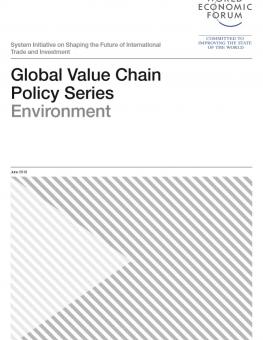
Global Value Chain Policy Series: Environment
This paper, part of the Global Value Chain Policy Series, examines questions that arise at the intersection of environmental sustainability and global value chains.
This paper examines two questions that arise at the intersection of environmental sustainability and global value chains.
The first relates to trade and other barriers to the smooth functioning of environmental goods and services value chains. The development, production and distribution of these products are vital for a sustainable, low-carbon future, but differences over definitions, protectionism and regulatory uncertainty pose challenges. The second question relates to how value-chain actors can be encouraged to improve sustainability outcomes throughout the value chain, particularly through sustainability standards and public-private initiatives.
Summary provided by the World Economic Forum.
Participating experts
You might also be interested in
Agreement on Climate Change, Trade and Sustainability: A landmark pact for trade and sustainability
The ACCTS pact, signed by Costa Rica, Iceland, New Zealand, and Switzerland, aligns trade and environmental policies, tackling fossil fuel subsidies, eco-labels, and green trade.
Addressing Carbon Leakage: A toolkit
As countries adopt ambitious climate policies, this toolkit examines strategies to prevent carbon leakage—when production and emissions shift to nations with weaker climate policies—and explores the trade-offs of each approach.
IISD Trade and Sustainability Review, December 2024
This edition of the IISD Trade and Sustainability Review presents four expert perspectives on how agricultural support and subsidies can promote sustainability in developing and least developed countries.
The Responsible Agricultural Investment Tool for Agribusiness and Case Studies
This report summarizes a collaboration to support agribusinesses in complying with principles of responsible investment in agriculture and food systems.